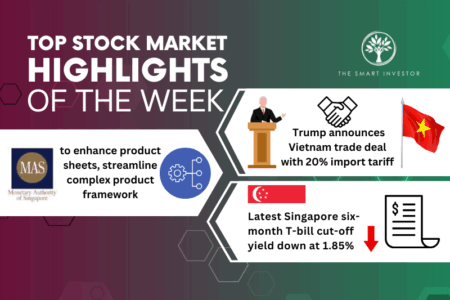The world is now bracing itself for a recession as an economic slowdown beckons across many industries.
Whether it is microchips or potato chips, companies are becoming cautious.
Taiwan Semiconductor Manufacturing Company (NYSE: TSM), the world’s largest chipmaker, has cut its capital expenditures for this year due to waning demand for microchips.
PepsiCo (NASDAQ: PEP), the maker of Lay’s Potato Chips, has warned that a “cost-of-living crisis” is likely to see reduced demand for its snacks and sodas.
Indeed, it seems almost everyone is predicting a recession with near certainty.
If this high conviction does not unsettle you, it should!
After all, recessions are notoriously tough to predict, with trained economists often failing at this seemingly simple task.
The reason for their apparent ineptitude?
Forecasting business cycles is extremely tough as expansions and contractions are driven by a myriad of random forces, or chance events.
It’s no wonder that predicting what lies ahead is much easier said than done.
Change is the only constant
We are often told to focus on the future rather than dwell on the past.
The problem, of course, is that it’s tough to know what to expect when change is the only constant.
Furthermore, with technological advancements moving rapidly in the new millennium, change is set to accelerate rather than slow down.
Hence, it is far from easy to gain a clear picture of what new trends or technologies will emerge in the coming years or decades.
Simply building on what exists today may severely discount the progress of humankind and the impact of human ingenuity in creating a better tomorrow.
Donald Rumsfeld, the former US Secretary of Defense and White House Chief of Staff, was famous for coining the term “unknown unknowns”.
On one hand, we gravitate towards what we know and are also aware of things we may not know.
But on the other hand, the events that cause the most disruption, such as the COVID-19 pandemic, are the“unknown unknowns” that, by definition, cannot be known ahead of time..
Extrapolating the past into the future
When the future is uncertain, investors gravitate to what they know: the past.
As such, many tend to extrapolate current events into the distant future.
The problem here is that extrapolation is based on historical trends, and history isn’t always the best guide to what happens in the future.
World-shattering economic events such as the Global Financial Crisis (2008-2009), the dot.com crash (2000-2002) and SARS (2003-2004) are examples of how extrapolation can completely fail us.
Such events are appropriately termed “once in a lifetime” and may never occur again.
Even if they did recur in some form, the sequence of events may turn out completely different to what was experienced back then.
Hence, knowing what to do and how to react when a completely new scenario presents itself is close to impossible.
Basing your knowledge on current information, news flow, corporate commentary and macroeconomic indicators may be inadequate.
Many of these metrics are backwards-looking, rendering them less useful when it comes to anticipating what comes next.
How you can navigate the (bumpy) road ahead
But if thinking ahead is near impossible, how then should you position your stock portfolio?
Warren Buffett’s quote provides a clue: predicting rain doesn’t count; building an ark does.
By setting your investment portfolio up well, you can capture significant upside while minimising your downside.
Park your money in robust blue-chip businesses such as DBS Group (SGX: D05) or Singapore Exchange Limited (SGX: S68).
These businesses have an enviable track record of going through good times and bad and can provide you with a good night’s sleep.
Another method is to stick with brand names that can stand the test of time.
Nike (NYSE: NKE), Starbucks (NASDAQ: SBUX) and Amazon (NASDAQ: AMZN) are some of the big names that people around the globe recognise.
Businesses that pay out consistent and increasing dividends should also be favoured.
Some examples include REITs such as Parkway Life REIT (SGX: C2PU), which has an unbroken track record of raising its core distribution per unit since 2006.
Companies such as Kimberly Clark (NYSE: KMB) or Procter and Gamble (NYSE: PG) are also famous for doling out steady and predictable dividend increases, demonstrating the strength of their franchises.
Coping with lingering uncertainty
Next, how should you cope with the constant uncertainty?
The solution is to constantly learn and adjust your beliefs in light of new information.
You should be mentally prepared to update or rebalance your investment portfolio based on new information that contradicts your previous beliefs.
By remaining open and adaptable, you can then optimise your portfolio by weeding out the losers and holding on to the winners.
Preparing instead of predicting
Finally, always remember to keep some cash handy.
You never know when an opportunity may arise to scoop up solid companies on the cheap.
A general rule of thumb is to have at least six months to a year’s worth of expenses parked as emergency funds.
Any amount exceeding this level constitutes your opportunity fund, which can then be deployed when suitable investment opportunities arise.
Maintaining an opportunity fund is strongly encouraged as it allows you to stand ready should markets crash without warning.
By ensuring you have ample dry powder, you are better prepared mentally for sharp falls because you will be confident of taking advantage of them rather than just sitting and watching.
This practice of keeping cash handy is a useful one as it does not involve predicting.
Instead, what you are doing is preparing and waiting till opportunity knocks by targeting suitable companies you would like to include or add more to within your investment portfolio.
Maintaining this discipline requires a strong heart coupled with the right mindset and temperament.
But if done right, you will reap the benefits of buying great companies at attractive valuations while freeing you of the constant headache of trying to predict what’s next.
Note: An earlier version of this article appeared in The Business Times.
If you’re looking to invest in 2023, our latest FREE report can guide you. It shows you how to find dividend stocks in SGX, and a nearly fool-proof way of building your portfolio. Many people love dividend investing, but few truly know how to profit from it consistently. Click the link here to download our new report and discover the secrets!
Follow us on Facebook and Telegram for the latest investing news and analyses!
Disclosure: Royston Yang owns shares of DBS Group, Singapore Exchange Limited, Nike and Starbucks.




